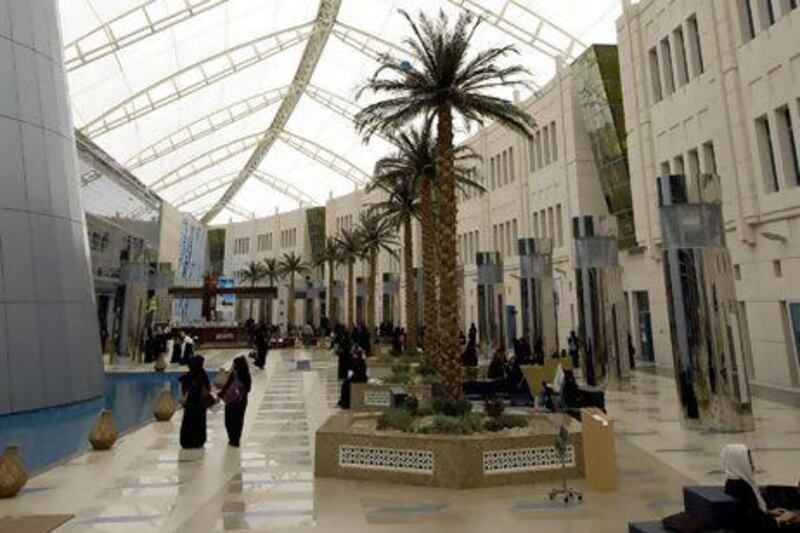DUBAI // Zayed University, the country’s youngest federal institution, is on a mission to grab the world’s attention.
Sheikh Nahyan bin Mubarak, Minister for Higher Education and Scientific Research and president of the university, has said it is time to aim for world rankings.
That means increasing research output and graduate studies, for which goals have been set.
The university is gaining pace in research, a key area for rankings.
“Our research has gone up about 30 per cent over three or four years,” said Dr Larry Wilson, the provost. “Many papers are appearing in top-level journals … the kind of thing that leads to international rankings such as citations.”
There are other areas where Zayed University, now in its 15th year, receives high marks.
“We already score highly in areas such as diversity of faculty,” said Dr Wilson. “We’re not going to score highly on diversity of students like universities such as the American University of Sharjah does because they have a more international student body.”
But he said the university had about 150 international students in postgraduate programmes.
Sheikh Nahyan said last month: “Now as we settle into our two permanent campuses and are able with fewer distractions to plan for our future, it is time to consider the validation of quality and prestige that international rankings confer upon a university.
“International prominence requires Zayed University to become a national leader in graduate education.”
Only about 10 per cent of the student body is enrolled in master’s programmes.
“That percentage needs to grow,” said Sheikh Nahyan, setting a target to double the percentage of graduate students over the next five years.
“That means, of course, not only increasing the number of students enrolled in existing programmes but also offering new full-time and executive master’s programmes in relevant fields. After the five-year period we will assess our readiness to offer doctoral degrees as well.”
Dr Wilson said putting a doctoral programme in place was a “big step and needs major resource commitment”, but the school would first focus on broadening its master’s offerings.
Academics are being hired with that in mind.
“We currently have 21 master’s programmes and that is not for international rankings, but to serve the needs of the community,” Dr Wilson said.
“In time, we’ll carry on moving up the rankings. It’s something we want to do but it will take time. We don’t play to the international rankings system like some institutions do.”
UAE University first made it to the QS World Rankings top 500 in 2009 and has since risen to 370. It is also ranked 48th on the top 50 universities under-50 list, which is for relatively new schools.
Dr Abdulla Al Khanbashi, vice chancellor of UAEU until last month, has overseen its rise.
“It’s encouraging for everyone in the university to be in the top 400 and it benchmarks what we do and our achievements to an international group,” Dr Al Khanbashi said. “Some universities in there have been around for hundreds of years and we’re very young.”
He said a good ranking attracted good students and helped parents to measure a university’s quality against international standards.
It also promotes competition – something positive for students, parents and academics.
“It makes everyone work for some type of improvement, in policies, standards,” Dr Al Khanbashi said. “It’s a competition.”
The American University of Sharjah entered the QS rankings last year in the 601+ bracket. This year, it has risen to the 401-450 bracket, scoring highly for its diverse student body and research production.
Abu Dhabi University was one of 2,500 universities to apply for the QS rankings this year and was among the best 500-550 universities.
“As a very young university of nine years, this is a remarkable achievement,” said Dr Nabil Ibrahim, the university’s chancellor.
Dr Ibrahim said the world-ranking process is a comprehensive way of assessing academic quality and effectiveness based on a number of measures, including faculty qualifications, research productivity and employability of graduates.
mswan@thenational.ae






